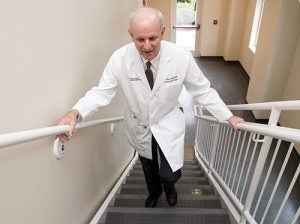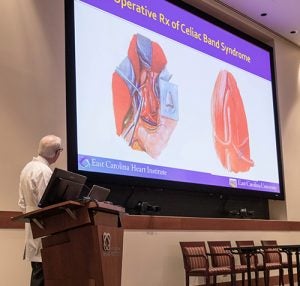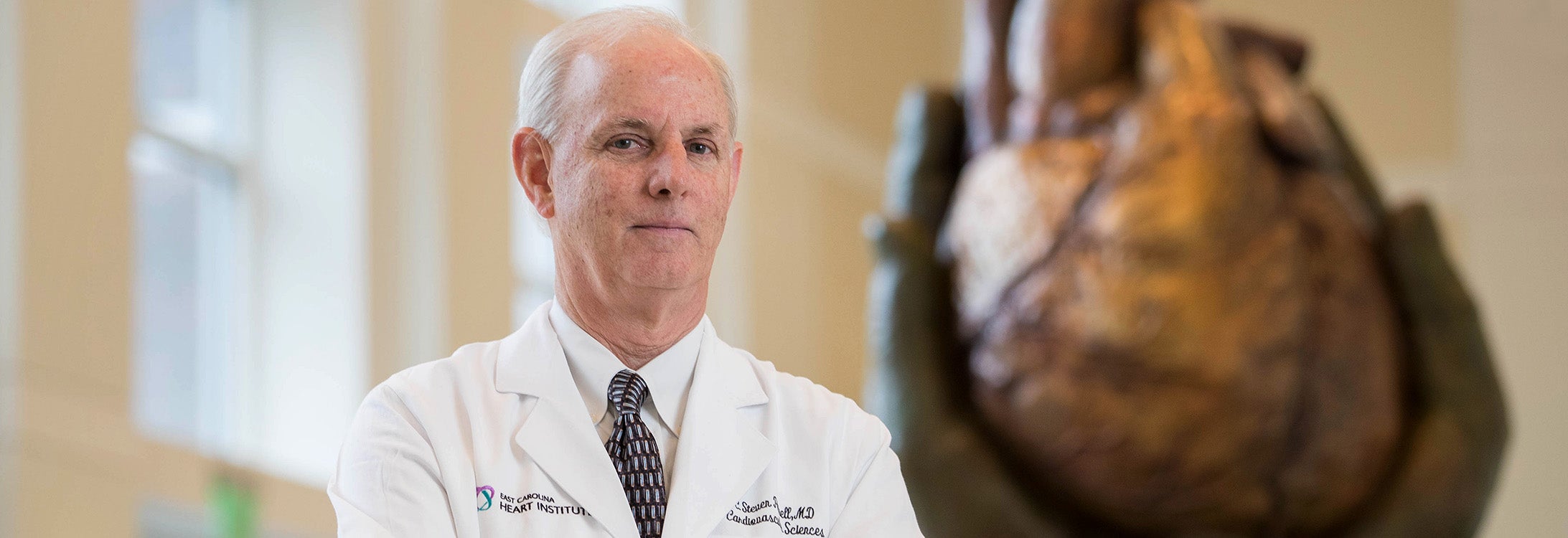POWER OF PREVENTION
ECU vascular surgeon shares his health journey with colleagues
When Dr. C. Steven Powell tells patients and fellow doctors about the importance of a healthy lifestyle in preventing diseases such as diabetes and heart disease, he is speaking from experience.
As a professor and chief of the Division of Vascular Surgery at ECU’s Brody School of Medicine, Powell can often be seen walking the stairs and eating healthy homemade lunches at the East Carolina Heart Institute at ECU, where he works. Powell adopted this lifestyle after being told by his own physician that he was pre-diabetic. Powell decided to first try getting healthier without medication; since then he’s had a clean bill of health.
Seeing the power of prevention firsthand reinforced its importance for Powell. Now he’s sharing his experience and his expertise with fellow doctors and medical students to improve the health of eastern North Carolina.

Powell takes the stairs at the East Carolina Heart Institute at ECU as part of a healthy lifestyle.
Powell has developed a new series of grand rounds called Atherosclerotic Peripheral Arterial Disease (aPAD) Academy: Advancing a Vascular Model of Care. In hour-long talks on the third Wednesday of each month, Powell discusses the risk factors, development, treatment and latest research on arterial atherosclerosis. Instead of traditional rounds where doctors go visit their patients, grand rounds are regularly scheduled meetings where physicians and other providers gather together to learn from recent case studies and get credit for continuing education.
Atherosclerosis, or the narrowing and hardening of the arteries due to plaque buildup, can have devastating consequences such as heart attack, stroke, kidney failure and limb loss if allowed to progress. It is highly prevalent in eastern North Carolina, but preventable.
“People just want to be fixed,” Powell says. “But they need to take initiative on their health. We’ve got to get the message out to the public and primary care doctors.”
The goal of the series is to raise awareness about aPAD and save precious medical resources by avoiding expensive interventions like surgery whenever possible, Powell says.
“Sometimes we get focused on perfecting procedures, but we’ve got to get patients to take care of themselves,” Powell told fellow physicians when the series began in the spring. “It’s the difference between sick care and health care.”

Powell holds Atherosclerotic Peripheral Disease Academy sessions for health care providers on the third Wednesday of every month from 7:15-8:15 a.m. at the East Carolina Heart Institute at ECU.
One unique thing about this series is its focus on the entire vascular system, not just the heart. Medical students get limited education about atherosclerosis throughout the body, Powell said.
As with other grand rounds, this series offers physicians an hour of credit per session through Brody’s Office of Continuing Medical Education. In addition, this series is being recorded and will be archived online through Eastern Area Health Education Center, a non-profit that provides continuing education and other resources to area health care providers.
“It’s often difficult for me to find time to give a talk, and it can be hard for physicians to obtain CME (continuing medical education) credits,” Powell said. “That’s why it’s important that we’re archiving this series.”
The next session is Aug. 16. The series continues through November.
For more information on this program, contact Terry R. Lewis at 252-744-7652 orlewist@ecu.edu.
